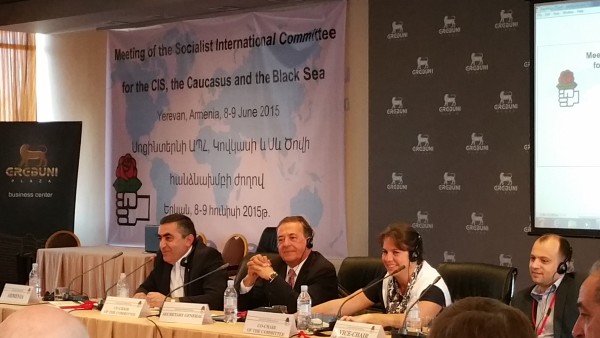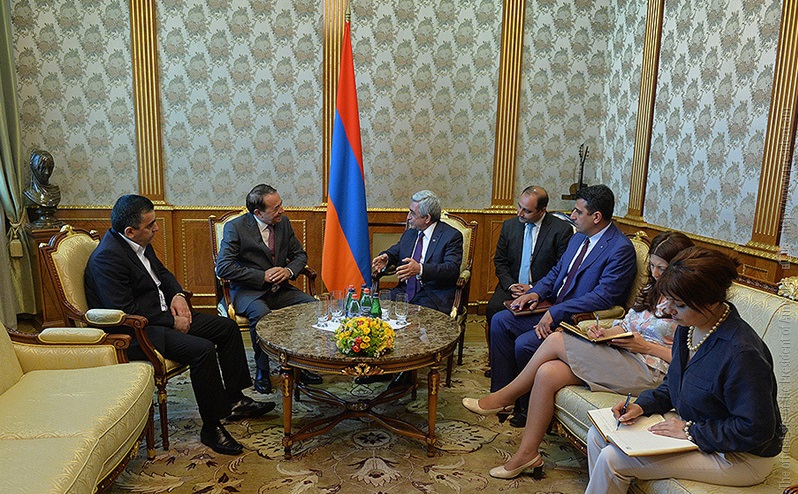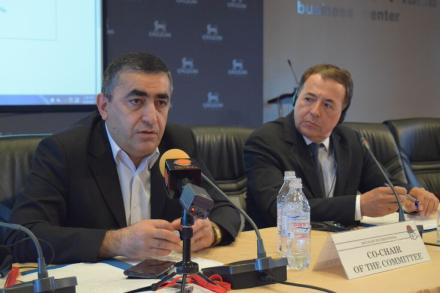
(L-R) Armen Rustamyan (Armenia ARF-D, co-chair of the committee), Secretary General Luis Ayala, Alexandra Dobolyi (Hungary MSzP, co-chair of the committee) and Oleg Tulea (Moldova PDM, vice-chair of the committee).
The meeting of the Socialist International Committee for the CIS, the Caucasus and the Black Sea took place on the June 8-9, in Yerevan, Armenia, was hosted by the ARF-D and was attended by members of the socialist and social democratic parties of the Russian Federation, Ukraine, Georgia, Kazakhstan, Belarus, Moldova, Hungary, Tajikistan and Azerbaijan. The meeting, which was opened by SI Secretary General Luis Ayala, was chaired by Armen Rustamyan (Armenia ARF-D, co-chair of the committee), Alexandra Dobolyi (Hungary MSzP, co-chair of the committee) and Oleg Tulea (Moldova PDM, vice-chair of the committee). Upon the proposal of Luys Ayala the meeting observed a moment of silence in memory of the late Vahan Hovhannisyan, ARF-D Bureau member, who had also served as the Committee’s co-chair. Secretary General Ayala made a special reference to Vahan Hovhannisyan’s active work which, he said, led to the enhancement of the engagement with Armenia. Referring to the Centenary of the Armenian Genocide Ayala said that he hopes that the day of real peace between Armenia and Turkey will come with the recognition of the Armenian Genocide. The Socialist International is a fine platform for the representatives of Armenia and Azerbaijan to express their opinions, Ayala underlined in connection to the Nagorno Karabakh conflict.
The agenda of the meeting included discussion about the current priorities of the social democratic agenda in the region, the work of SI members in strengthening and extending democracy and the role and tasks in securing peace and the resolution of conflicts in the region; brief reports on the national situation in countries of the CIS, Caucasus and Black Sea; and adoption of a Declaration of the meeting.
“In general we are addressing current political matters, issues of social democracy as well as solutions aiming at those problems. Certainly, new geopolitical developments, especially the events in Ukraine, are an important part of the discussion. However there are many issues in the CIS region to be touched on, Nagorno Karabakh being one of those” said ARF-D Bureau member and Co-chair of the Committee, Armen Rustamyan.
The Committee convened for the first time in Yerevan, in June 2010 and the following meeting took place on October of the same year, in Baku and was attended by an ARF-D delegation.
On the theme of conflict resolution, the committee reiterated the fundamental belief of the international that peace is necessary for development and prosperity. The declaration reflected the established position of the International on the need for dialogue as a means to bring unresolved conflicts to an end. The committee further called for a ceasefire and respect for international law in eastern Ukraine, and adherence to the provisions contained in the Minsk II agreement.
Conflict is also linked to democracy, as the establishment of genuine democracy can help to eliminate the deficit in rights and freedoms that is a cause of conflict. In-depth exchanges took place on strengthening and extending democracy in recognition of the lack of effective democracy in the countries represented at the meeting. Delegates reflected on the need for the free expression of political will and discussed ways in which member parties of the Socialist International in the CIS, Caucasus and Black Sea could better cooperate to advance shared aims.
Democracy is not just about elections, but is also reflected in the opportunities granted to opposition parties in the period between elections. In a functioning democracy the opposition has an important role as a counterweight to the government and able to ensure that it does not rule without scrutiny. The severely diminished and suppressed opposition in many countries of the region is left neither able to hold the government to account nor build for future elections.
Participants also agreed to place strong emphasis on the social democratic agenda as a way to better communicate the message of social democracy. It was agreed that social democracy was greatly needed in the region in order to present a viable alternative to nationalism and neo-liberalism. The social democratic ideology, which focuses on the needs of all rather than a privileged few, should resonate with citizens deprived of their rights under authoritarian and anti-democratic regimes.
One particular area in which members of the SI were taking the lead was in the fight against corruption, which must be eliminated with the help of reinforced institutions, a strong and independent judiciary and a clear and transparent framework for the pursuit and eradication of financial misconduct.
The reports on national situations in the countries represented were given in the context of the themes of the meeting. Delegates heard how new presidential elections in Belarus would take place later in 2015 despite the continued imprisonment of presidential candidate Mikalai Statkevich following the previous elections. A message from Statkevich was read out in which he thanked the SI for its support and reaffirmed his commitment to freedom, justice and solidarity.
Democracy is also absent in Tajikistan, where the ruling elite has vastly superior power and resources and is denying fundamental rights. An increase in ethnic and religious tensions has also contributed to a precarious situation. The opposition had been denied its democratic right in Kazakhstan, where the SI member party the OSDP was preparing for the next parliamentary elections and trying to present an alternative to the dominance of the ruling party. Azerbaijan also reported problems with elections and public administration.
In Armenia, the ARF was making efforts to improve the system of governance, as this would bring about more effective development and strengthen democratic pluralism. This was a great challenge due to the lack of influence wielded by the opposition and a void in between elections. Progress had been made on democracy in Georgia at the 2012 election, but the ruling coalition had not yet been able to overcome the country’s economic obstacles, and the task for social democrats was to engage students, trade unions and workers to change the neoliberal consensus. Difficulties of a different nature had been experienced by the SI member party in Moldova, where delays in forming a coalition and a banking scandal had left the situation unstable.
The committee was updated on latest developments in Ukraine, and heard calls from the representative of that country for withdrawal of forces and respect for the integrity of Ukraine’s borders. Democracy in Ukraine was also experiencing severe difficulties, with the authorities trying not to allow room for new political parties to operate. The Russian delegation called for a focus on the social democratic agenda in the region, to counteract neoliberal and neo-nationalist powers which were turning the post-Soviet region into a battlefield.
At the conclusion of the meeting, members of the committee adopted a declaration that encompassed the main points of agreement.
DECLARATION
The Socialist International Committee for the CIS, the Caucasus and the Black Sea, meeting in Yerevan on 8-9 June 2015, discussed the regional priorities of strengthening and extending democracy, securing peace and the resolution of conflicts and advancing the social democratic agenda.
Strengthening democracy
In many countries of the region, the democratic process and its institutions need to be strengthened, and social democratic parties can be at the forefront of these efforts.
The committee condemns the anti-democratic practices prevalent in countries of the region, where a lack of free and fair elections give no prospect of a democratic change in government. Opposition parties are too frequently being denied their voice, with the incumbent ruling elite able to suppress opposition by manipulating their access to power. The free expression of political will and its translation into representation is the foundation of any true democracy and the development of multi-party democracies is crucial.
The committee supports the proposal of its member party for the transition to a fully proportional election system in Armenia, with a corresponding move towards constitutional changes aimed at adopting a parliamentary form of governance. The country also needs legal measures to strengthen the opposition in its role of controlling and counterbalancing the authorities, and full independence of the judiciary.
The committee noted that presidential elections will once again be held in Belarus, despite the many unresolved issues arising from the previous election in 2010. The arbitrary jailing of political opponents is unacceptable and we reiterate the support of the SI for Mikalai Statkevich, who remains imprisoned despite repeated calls from the SI and other international actors for his release.
The committee expresses its solidarity with the SI member party in Kazakhstan, the OSDP, in building a broad coalition of the National Civic Assembly in preparation for upcoming parliamentary elections. It supports all efforts by the party to to provide real an alternative to authoritarianism in the form of a democratic and socially responsible state.
The committee welcomes the profound democratic changes in the spheres of freedom of speech, media and political pluralism, which have taken place in Georgia since 2012. We further encourage the ruling coalition to prioritise development-oriented policies, to enable Georgia to achieve a more inclusive and just economy and fight extreme poverty and inequality.
The committee considers that the establishment of genuine democracy can also help advance the cause of conflict resolution, by eliminating the deficit in rights and freedoms that is a cause of conflict.
Conflict resolution
The committee recognises that the region’s unresolved conflicts are a matter of urgent concern, and emphasises the need for peace and protection of life as an utmost priority. Peace comes before all else, as without it there can be no prosperity or development. Conflict also brings additional challenges to democracy when it is used as a pretext for restricting opposition and consolidating power.
The work of the committee underlines the fundamental importance of dialogue to the process of conflict resolution, and bringing together delegates from Armenia and Azerbaijan in Yerevan demonstrates the unique character of the Socialist International in this regard. Resolving such a long-standing dispute, with many intersecting claims on the different sides will require great patience and commitment. The SI will continue to prioritise this spirit of dialogue and mutual understanding through the work of its committee and use the opportunity created by this meeting to reach out to the leadership of both countries in the interests of peace.
The committee reiterates its declaration on overcoming conflicts and securing peace in the region issued in Astana in September 2014, and regrets the lack of progress made in securing a genuine ceasefire in Ukraine. We urge the parties to the conflict to uphold international law and implement the ceasefire as outlined in the Minsk II agreement, along with all the other provisions therein.
The social democratic agenda
The committee considers that social democracy is greatly needed in the region to develop and strengthen as the alternative to nationalism and neo-liberalism. The challenge for social democratic parties in the region is to communicate their vision for the country in a way that resonates with ordinary citizens. In light of the deficiency of democracy in the region, it is important that social democratic parties enhance cooperation with like-minded partners in other countries to build a coherent message.
Social democracy has a vital role to play in the battle against inequality, which is of utmost importance to the long-term development of countries of the region and prosperity of its citizens. The role of social democracy is to constructively oppose policies that focus merely on serving narrow interests, and instead prioritise the promotion of equality, social justice and sustainable development in the interest of all citizens.
Social democratic parties are committed to the fight against corruption, which is a means by which power becomes entrenched and public funds are diverted away from their intended purpose. Corruption is a scourge and must be tackled in all its forms, with the help of reinforced institutions, a strong and independent judiciary and a clear and transparent framework for the pursuit and eradication of financial misconduct.
Joint Press Conference
On June 9 after the closing of the meeting, Secretary General Ayala and Co-chair Armen Rustamyan held a joint press conference and presented the results of the meeting. Ayala stated that the peaceful resolution of the conflicts in the region, the strengthening and extending of democracy, and the current priorities of social democracy of the countries in the region are on SI’s agenda and some very important conclusions were drawn at the Yerevan meeting, Ayala said.
The Secretary General spoke highly of ARF-D pointing out the importance for SI of having such an important partner in this region. “The SI party-members try to reinforce democracy in their respective countries and in many cases they are the alternative to the authorities. On the other hand it is also very important to note that a delegation from Azerbaijan’s Social Democratic Party was also present here in Yerevan”. Ayala added that the dialogue on Nagorno Karabakh will be pursuit within the SI platform and went on saying that the strengthening of democracy is an important element not only in this but in any case of conflict resolution.
Armen Rustamyan underscored that the SI Committee for the CIS, the Caucasus and the Black Sea gives the opportunity to conflicts sides to meet in a common platform and exchange their views. Rustamyan noted that the Committee’s format is unique and that the member countries have the chance of bringing to the table the matters that concern them. He mentioned that the Committee is quite vibrant and that it is in position of playing its own role.
“Here we try to reach a consensus. Mutual understanding, is our main objective”. Rustamyan added that everything must be done in order to have a mutual agreement through the contribution of democratic values he said with regards to the Azeri representative’s remarks and underscored that the Azeri counterparts as well share the same principle. “We have excluded war as a means of resolving our issues” said Rustamyan.
SI Secretary General, President of Armenia meet
On June 9, SI Secretary General accompanied by ARF-D Bureau member Armen Rustamyan met with the President of Armenia, Serzh Sargsyan.

SI Secretary General Luys Ayala and ARF-D Bureau member Armen Rustamyan (left) meet with President Sargsyan
President Sargsyan welcomed SG Ayala to Armenia and expressed the hope that the Committee’s Yerevan meeting had been successful. Serzh Sargsyan greatly appreciated the work done by the SI uniting together the world’s socialist and social-democratic political forces which has proclaimed freedom, justice and solidarity as its political values. Sargsyan stressed that those values have always been crucial to Armenians.
The SI Secretary General expressed satisfaction with the discussions held during the meeting. Briefly presenting the activities of the SI, Luis Ayala underscored that cooperation with Armenia through the SI member ARF-D has been strengthening year after year. He noted that the organization has expressed his solidarity with the ARF-D’s position on amending the Constitution, of the Republic of Armenia placing importance on deepening domestic reforms and pushing forward the democratic agenda.
At the meeting, the interlocutors discussed the challenges posing threat to regional peace and stability, touched upon the Nagorno Karabakh peace process mediated by the OSCE Minsk Group, the present issues, the relationship between Armenia and Turkey and upon the international recognition and condemnation of the Armenian Genocide.
The Armenian president expressed his thanks to the SI for taking constructive positions on issues of crucial importance to Armenia both on the international stage and in home countries of SI member parties.
The Socialist International is the worldwide organization of social democratic, socialist and labor parties. It currently brings together 170 political parties and organizations from almost 140 countries.
In 2003, ARF-D was the first one among CIS political parties, to hold a SI full membership status.
ARF-D Bureau member, Mario Nalbandian serves as SI Vice-President while ARF-D Bureau member Armen Rustamyan is Co-Chairman of the Committee for the CIS, the Caucasus and the Black Sea. ARF-D is also a member of the Statutory Committee on Finance and Administration of the SI.
The ARF-D Women’s Group is a full member of the SIW (Socialist International Women). The youth organization of the ARF-D, the Armenian Youth Federation, is a full member of the IUSY (International Union of Socialist Youth).








